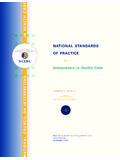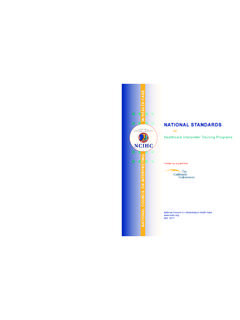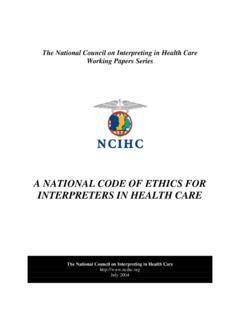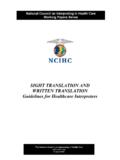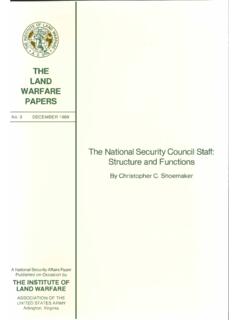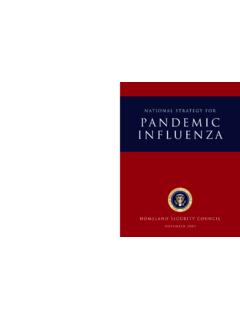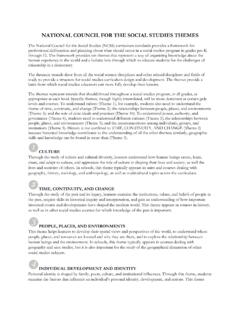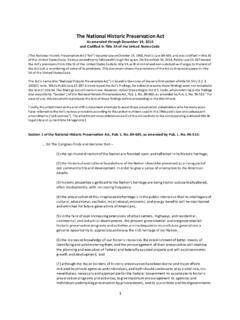Transcription of National Standards of Practice - NCIHC
1 I N H E A LT H C A R E.. National Standards . OF Practice . for Interpreters in Health Care . N AT I O N A L C O U N C I L O N I N T E R P R E T I N G. Funded by a grant from National council on Interpreting in Health Care September 2005. CONTENTS. COMMITTEE ..ii BOARD ..ii ACKNOWLEDGEMENTS ..iii INTRODUCTION ..1. Standards OF Practice ..5. Accuracy ..5. Confidentiality ..6. Impartiality ..6. Respect ..7. Cultural Awareness ..7. Role Boundaries ..8. Professional Development ..10. Advocacy ..10. GLOSSARY ..11. 2005 National council on Interpreting in Health Care, Inc., All Rights Reserved. The NCIHC National Standards of Practice for Interpreters in Health Care is in the public domain and may be reproduced as is in its current format under the copyright law of fair use.
2 No changes may be made to the document except by the National council on Interpreting in Health Care. Persons seeking to use this document should contact NCIHC . i COMMITTEE. PREPARED BY THE Standards , TRAINING AND CERTIFICATION COMMITTEE. Co-Chairs Karin Ruschke, MA. President, International Language Services, Inc. Interpreter Trainer, Program Development Consultant Shiva Bidar-Sielaff, MA. Manager of Interpreter Services/Minority Community Relations University of Wisconsin Hospital and Clinics Members Maria-Paz Beltran Avery, PhD. Strategic Director, Education Development Center, Inc. Member, Certification Committee of the Massachusetts Medical Interpreters Association Bruce Downing, PhD. Associate Professor and Director of the Program in Translation and Interpreting University of Minnesota Carola E.
3 Green Interpreter, Translator, Interpreting Trainer Project Coordinator, Vista Community Clinic Linda Haffner Freelance Consultant, Trainer, and Spanish Interpreter/Translator BOARD. REVIEWED AND APPROVED BY THE NCIHC BOARD OF DIRECTORS. Wilma Alvarado-Little, MA, Co-chair of the Board Maria Michalczyk, RN, MA, Co-chair of the Board Elaine Quinn, RN, MBA, CST, DSA, Treasurer Lisa Morris, MSTD, Secretary Cynthia E. Roat, MPH, Chair of the Advisory Committee Sabrina Morales, Co-chair of the Research and Policy Committee Elizabeth Jacobs, MD, Co-chair of the Research and Policy Committee Joy Connell, Co-chair of the Organizational Development Committee Esther Diaz, MEd, Co-chair of the Organizational Development Committee Julie Burns, MEd, Co-chair of the Membership and Outreach Committee Marjory Bancroft, MA, Co-chair of the Membership and Outreach Committee Shiva Bidar-Sielaff, MA, Co-chair of the Standards , Training and Certification Committee Karin Ruschke, MA, Co-chair of the Standards , Training and Certification Committee 2005 National council on Interpreting in Health Care, Inc.
4 , All Rights Reserved. The NCIHC National Standards of Practice for Interpreters in Health Care is in the public domain and may be reproduced as is in its current format under the copyright law of fair use. No changes may be made to the document except by the National council on Interpreting in ii Health Care. Persons seeking to use this document should contact NCIHC . ACKNOWLEDGEMENTS. This work was generously funded by The Commonwealth Fund and The California Endowment. We would like to thank the project coordinators, Esther Diaz and Patricia Ohmans/Health Advocates, for their commitment to this project and Marjory Bancroft for her work on the Environmental Scan. We would like to specially recognize the many interpreters and other individuals who participated in our focus groups and responded to our survey, and the expert consultants who provided us with valuable input.
5 2005 National council on Interpreting in Health Care, Inc., All Rights Reserved. The NCIHC National Standards of Practice for Interpreters in Health Care is in the public domain and may be reproduced as is in its current format under the copyright law of fair use. No changes may be made to the document except by the National council on Interpreting in Health Care. Persons seeking to use this document should contact NCIHC . iii INTRODUCTION. This introduction to the National Standards of Practice for Interpreters in Health Care explains the context in which the Standards were developed, describes the process of development, and sug- gests ways in which the Standards can be used. In 2004, the National council on Interpreting in Health Care1 ( NCIHC ) published the National Code of Ethics for Interpreters in Health Care.
6 Development of the code of ethics followed an extensive period of gathering input and counsel from working interpreters and their colleagues. Through a similar consensus-building process, the NCIHC has now developed a set of Standards of Practice for interpreters working in health care settings. This project built on the work in Standards devel- opment at the individual state level, specifically on the pioneering work of the Massachusetts Medical Interpreters Association (MMIA)2 and the California Healthcare Interpreting Association (CHIA)3. While we reviewed the Registry of Interpreters for the Deaf (RID) Standards of practice4. and received input from American Sign Language interpreters, our focus and expertise lies in spo- ken language interpreting and therefore these Standards represent a consensus on Standards for spoken language interpreters.
7 WHAT ARE Standards OF Practice ? Standards of Practice are a set of guidelines that define what an interpreter does in the perform- ance of his or her role, that is, the tasks and skills the interpreter should be able to perform in the course of fulfilling the duties of the profession. Standards describe what is considered best Practice by the profession and ensure a consistent quality of performance. For health care inter- preters, the Standards define the acceptable ways by which they can meet the core obligations of their profession the accurate and complete transmission of messages between a patient and provider who do not speak the same language in order to support the patient-provider therapeutic relationship.
8 As in all professions, the field of interpreting is guided by ethical principles. These Standards for health care interpreters show how professional interpreters respond to ethical and other consider- ations in the performance of their duties. Standards of Practice are concerned with the hows of performance as compared with codes of ethics that focus on the shoulds. A code of ethics provides a set of principles or values that govern the conduct of members of a profession while they are engaged in the enactment of that profession. 5 In other words, codes of ethics provide guidelines for making judgments about what is acceptable and desirable behavior in a given context or in a particular relationship 6 while Standards focus on the practical concerns of what the interpreter does in the performance of his or her role, offering best Practice strategies for observing the principles of the code of ethics in day-to-day Practice .
9 1. A National Code of Ethics for Interpreters in Health Care. National council on Interpreting in Health Care, 2004. 2. Massachusetts Medical Interpreters Association and Education Development Center, Inc. Medical Interpreting Standards of Practice . Newton: EDC, 1996. 3. California Standards for Healthcare Interpreters: Ethical Principles, Protocols, and Guidance on Roles & Intervention; California Healthcare Interpreting Association, 2002. 4. Registry of Interpreters for the Deaf; 5. A National Code of Ethics for Interpreters in Health Care, National council on Interpreting in Health Care, 2004.. 6. See Footnote 5.. 2005 National council on Interpreting in Health Care, Inc., All Rights Reserved.
10 The NCIHC National Standards of Practice for Interpreters in Health Care is in the public domain and may be reproduced as is in its current format under the copyright law of fair use. No changes may be made to the document except by the National council on Interpreting in Health Care. Persons seeking to use this document should contact NCIHC . 1. WHY ARE PROFESSIONAL Standards OF Practice FOR INTERPRETERS IN HEALTH CARE NEEDED ? Health care interpreting is a distinctive and specialized area of Practice . Interpreters working in health care facilitate communication between providers and patients or families who do not share a language. Although in recent years health care facilities and agencies across the United States have made strides in providing linguistically appropriate services, the lack of qualified interpreters continues to be a barrier to health care for limited English proficient (LEP) patients.

